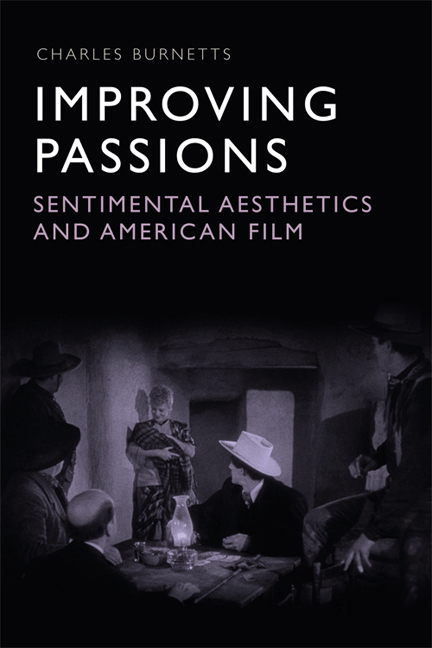Book contents
- Frontmatter
- Contents
- Acknowledgements
- Introduction
- 1 Towards a Genealogy of Sentimentalism in the Eighteenth and Nineteenth Centuries
- 2 Sentimental Aesthetics and Classical Film Theory
- 3 The Sentimental Chaplin: Comedy and Classical Narrative
- 4 Affect, or Postmodern Sentimentalism
- 5 The Sentiments of War in Spielberg and Tarantino
- 6 Sentiment and the ‘Smart’ Melodrama
- Conclusion
- Bibliography
- Index
6 - Sentiment and the ‘Smart’ Melodrama
Published online by Cambridge University Press: 20 December 2017
- Frontmatter
- Contents
- Acknowledgements
- Introduction
- 1 Towards a Genealogy of Sentimentalism in the Eighteenth and Nineteenth Centuries
- 2 Sentimental Aesthetics and Classical Film Theory
- 3 The Sentimental Chaplin: Comedy and Classical Narrative
- 4 Affect, or Postmodern Sentimentalism
- 5 The Sentiments of War in Spielberg and Tarantino
- 6 Sentiment and the ‘Smart’ Melodrama
- Conclusion
- Bibliography
- Index
Summary
Notwithstanding the significant tonal differences between the films examined in the previous chapter, both serve as examples of a post-classical Hollywood cinema that displays a ‘knowingness’ with regards to the genres and typologies it draws on. Their status as fundamentally post-classical films is predicated indeed on their tendency, like that of many contemporary Hollywood films, to negotiate the ‘array’ of perspectives and subject positions that characterise a postmodern culture of hybridity and eclecticism. The ‘New Sincerity’ of Private Ryan represents not simply a reversion to classical film-making, but rather a specific reaction and negotiation of the eclectic tastes and literacies of modern cinema-going audiences. Refracted through Tarantino's style, the post-classical war/combat genre takes on elements of a ‘mass camp’, signalling an aesthetics of disinterest and irony that is far from confined to the gay subcultures from which it may have emerged. What is indicated above all by such tendencies, whether of new sincerity, camp, or interactions between the two, is the extent to which postmodern processes of recycling and hybridity have become entirely familiar to us as modern spectators.
Sentimentality, as discussed above, becomes a significant term within this discussion precisely at the point therefore at which the ‘Law of the Heart’ and its emphasis on ‘fellow-feeling’ is challenged as any kind of aesthetic dominant within US cinema and its broader media culture. Examining the eclecticism of both Saving Private Ryan and Inglorious Basterds, it is shown that the ‘submission-response’ that characterises the sentimental, as cognitivists have identified as a response to melodramatic devices, is one that is challenged by film's very materiality as a medium of spectacle, and suffers indeed another ‘decline’. As much as the widely melodramatic conventions of Hollywood film seek as always to overwhelm the spectator with ‘awe-inspiration’ or the quasi-religious triumph of unalloyed virtue, it now contends with various affects of disinterest and postclassical sophistication. This ‘waning of affect’ as Frederic Jameson refers to it, takes camp and disinterest as a defining condition of late-capitalist consciousness, and true to its theoretical forebears in poststructuralist notions of difference and discontinuity, finds solace in the idea of a logos (or for our purposes, an ethics) that is productively undermined.
- Type
- Chapter
- Information
- Improving PassionsSentimental Aesthetics and American Film, pp. 142 - 157Publisher: Edinburgh University PressPrint publication year: 2017



